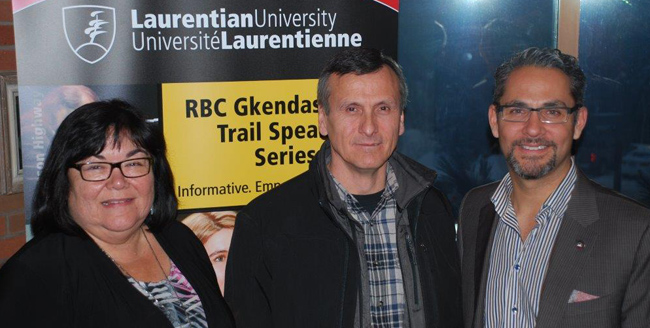Past, Present, Future: business leader urges everyone to the table to support First Nation entrepreneurs

By Laura E. Young
SUDBURY – The head of the Canadian Council for Aboriginal Business urged indigenous people to return to their entrepreneurial roots where they were the engine that drove the economy.
Jean Paul Gladu also urged all community members to come together to create opportunities for aboriginal people and business stakeholders.
Gladu, president and CEO of the Canadian Council for Aboriginal Business was the guest speaker of the RBC Gkendassawin Trail Speaker Series at Laurentian University on February 4. His talk addressed Past, Present and Future: creating sustainable partnerships between indigenous and on-indigenous communities.
Still, before the opportunities are created, the communities must deal with the underlying and fundamental challenge of re-establishing trust between indigenous and business communities, Gladu said.
In that way, rebuilding will come from a place of “good hearts and good will to actually work together in a meaningful way,” Gladu said.
Industry may well have some ignorance of how to work with communities, as they may not see the full depth of what an indigenous community can contribute, he added.
“Their shareholders are demanding bottom line, bottom line. Sometimes the bottom line is not going to get you where you’re going to go. That will get you into a lot of friction, rather than investing the time and energy and resources to build that trust again.”
In response to audience questions about how to even start building trust, he suggested business leaders proceed by working with indigenous communities – without an agenda.
Mentor the local entrepreneurs, support pow wows and local hockey teams, “and be patient,” he said.
As for indigenous communities, there is work to be done within, he added.
“There’s a lot of sickness in our communities. Those need to be addressed in tandem,”
He called for community support and empowerment of the entrepreneurial spirit.
“We’ve done a lot of research as well that the challenges are also just getting access to financing. The Indian Act isn’t friendly when it comes to getting financing and getting good people to manage our companies, externally and internally,” he said.
Corporate boards need greater diversity, including more women and indigenous people. “If we’re all male and stale on our boards how do we represent (the general population)? “Diversity breeds strength,” he added.
Still, Gladu remains optimistic, despite the challenges.
“I am in a job where we celebrate success. You can see the growth year after year. I work with progressive companies.”
As well, industry is recognizing that bands appear to be winning 90 per cent of the court cases.
“No one succeeds with court. When you lead with a business foot, treaties fall into place. When you get a foothold where we drive and share in the communities then things fall into place,” he said.
Gladu is one in a long line of speakers along the university’s Gkendassawin Trail, including writer Tomson Highway, social-justice activist and historian Roxanne Dunbar-Ortiz, and Drew Hayden Taylor.


